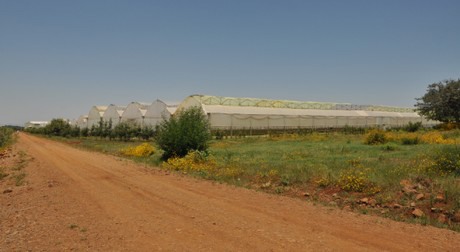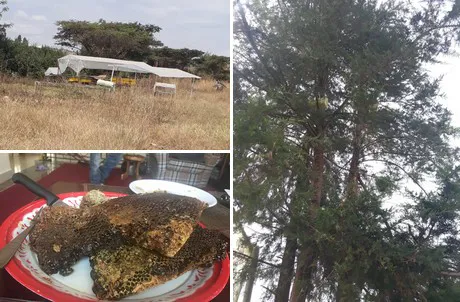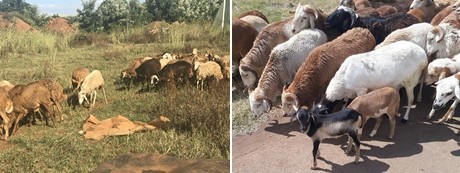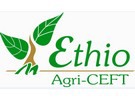'We live on this globe, and we need to take care of it.' With this in mind Ethiopian company Ethio Agri-Ceft Plc decided to make their two rose farms more environmentally friendly, and started to focus on integrated farming, several years ago. They now have 30 bee hives, 150 sheep, fish in their ponds, and they do not use any chemicals. Next year, they will increase the number of plants outside the greenhouse that attract insects. General Manager Esayas Kebebe is proud of the developments and the results and is looking forward to showing buyers and other growers around during the week of the HortiFlora Expo 2019 in March next year.
Esayas Kebede.
Fish, sheep and bees
Ethio Agri-Ceft Plc produces roses in two regions: in the Amhara region at Bahir Dar (Agri-Lake Flowers), and in the Oromiya region at Holeta (Holeta Agri-Flowers). At both farms, they started integrated farming four years ago, putting fish in their four ponds. "The water from these ponds, we use to irrigate the flowers", says Kebebe.
 Farm Agri-Lake Flowers.
Farm Agri-Lake Flowers.
Two years after, they continued their environmental practices by starting bee and sheep keeping. In total, they have 30 bee hives (traditional and modern) and 150 sheep divided over their two farms. "With the extinction of the bees in mind, we decided to place hives and plant flowers that bees like. In turn, we can harvest our own fresh honey."
 Modern and traditional bee hives at Holeta.
Modern and traditional bee hives at Holeta.
At their Holeta farm, they have 70 sheep walking around, and 80 at their Bahir Dar farm. "The sheep keeping, we started for the dung, which we can use to fertilize our crop."
 Sheep at Bahir Dar site and sheep at Holeta site.
Sheep at Bahir Dar site and sheep at Holeta site.
Fertilizers
Next to the sheep dung, more environmental friendly practices are implemented to fertilize the crop. The plant waste, for example, is used as compost. "We have many millions of worms to compost the plant waste. We use the compost tea, so in a liquid form."
No chemicals
Ethio Agri-Ceft Plc tries to have two farms free of chemicals. In order to do so, they found different ways to protect their crops. "I have a milk factory, and we use the whey (the liquid remaining after milk has been curdled) as a fungicide. After trialing this product for some time, we saw that it works really well to avoid fungus problems."
And to protect the good insects in the greenhouse, soap berries are used. "We grow them on the farm, and we extract the powder from it."
Fewer costs - better environment
On top of becoming a more environmentally friendly company, Kebebe sees that their efforts are reducing some costs as well. "We reduced our costs on fertilizers by 30 percent and the costs on chemicals by 20 to 30 percent."
More to come
And more practices are in the pipeline. In order to keep insects out of the greenhouse, they planted several plants outside the greenhouse that attract insects. "We have already planted some of these plants outside one of our greenhouses, and we are satisfied with the results. Therefore, we decided to plant these plants outside all of our greenhouses next year."
On top of that, they are also planning to expand their greenhouses by 10 ha next year.
Spreading the word
Kebebe is eager to spread the word of their environmentally friendly practices. "I think it is important to promote that flower farms can be clean of chemicals. Particularly nowadays, when the environment is becoming an increasingly important topic."
He is eager to show the buyers and other growers around at their farms. "From March 13-15, the HortiFlora Expo 2019 will be held in Addis Ababa, Ethiopia, and I think it would be a great opportunity for buyers and growers to see how our farm is operating."
But why give your secret away to growers? "Protecting the environment is very important to us, and we are eager to contribute to it in any way we can."
Holeta Agri-Flowers and Agri-Lake Flowers
Holeta Agri-Flowers and Agri-Lake Flowers are part of the larger Ethio Agri-CEFT Plc that was founded in 1998. In total, roses are grown on 30 ha (15ha at Holeta Agri-Flowers and 15ha at Agri-Lake flowers), but there is still room to expand; the property in Holeta is 28 ha and the one in Addis Ababa is 52 ha. The farms are dedicated to the export of roses for markets across the world. The majority of the roses (around 95 percent) are sold through the FloraHolland auction in the Netherlands.
For more information: 
Ethio Agri-Ceft Plc
Email: esake21@yahoo.com,
ethioagriceft@ethionet.et,
sonyanbesso@yahoo.com
www.ethioagriceft.com
